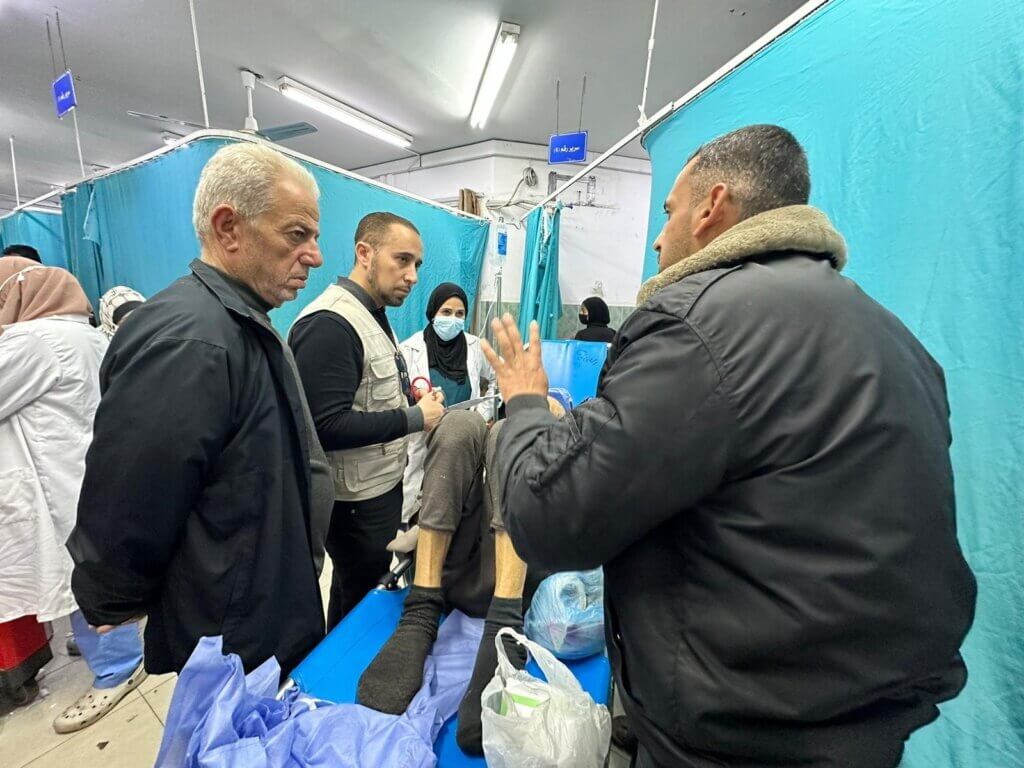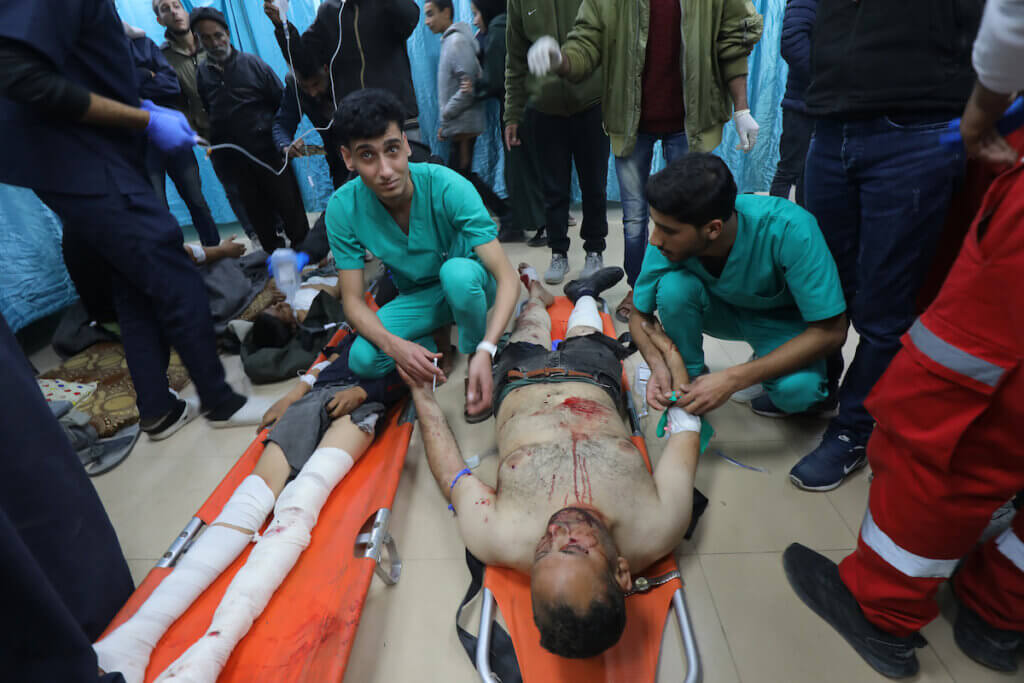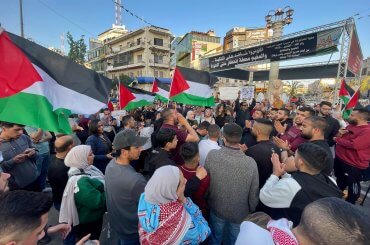When I left Gaza two weeks ago, my colleagues at the European Hospital in Khan Younis were already overwhelmed and burned out. Now, they are terrified that what took place at nearby Nasser Hospital, which Israeli troops invaded last Thursday, leading to the deaths of at least four patients, will happen there.
I shudder at the thought of what that would mean for the patients and medical staff I grew close to during my two weeks working there. I shudder more at the prospect of a looming “massive” invasion of the city of Rafah, where 1.5 million people fled to for safety from Israel’s devastating military assault, knowing the carnage this would cause to the people crowded into Rafah with nowhere to flee. UN officials and humanitarian groups have issued dire warnings that an Israeli invasion of Rafah would result in a “bloodbath.” Indeed, over 100 people were killed in Rafah on February 11 alone as Israel ramped up its bombardment. I was able to reach some of my colleagues and patients from my time in Gaza who have sought refuge in Rafah. They are terrified of what is to come, but until now, they are still alive.

I was in Gaza leading a five-person medical delegation. Our team consisted of me (an oncologist), two surgeons, an anesthesiologist, and a nurse. We only had to look into the eyes of our colleagues at the European Hospital in Khan Younis to understand the depth of their exhaustion. We dove in wherever support was needed; wound care, amputations, surgeries–even those outside of our specializations. My team had never witnessed these kinds of explosive injuries before. We worked under the constant buzz of Israeli military drones and vibrations from ever-closer and more frequent bombings. On my ninth day, shrapnel killed a man outside the hospital. On my tenth, the bombing cut the electricity, and ceiling tiles fell on us as we worked. I thought about death every minute, but the fear allowed me to better understand what more than 2 million Palestinians in Gaza have endured the last four months, half of them children.
Only 13 of Gaza’s 36 hospitals are even partially functioning as a result of the Israeli military’s systematic targeting of Gaza’s healthcare system. Israel has killed over 600 medical workers, injured nearly 800 more, and abducted scores. Hospitals are functioning at 400% capacity and with dire shortages of basic medical supplies with which to treat the wounded, not to mention addressing outbreaks of hepatitis A, diarrhea, scabies, and lice.
Given the scale of the injuries, combined with the near total-collapse of the medical system, there has been no care at all for hundreds of thousands of patients with pre-existing illnesses.
Before Israel’s attack began in October, there were approximately 10,000 cancer patients in Gaza. Those who are still alive are unable to receive chemotherapy, immunotherapy, surgery, radiation, or pain medication. There are no biopsies or scans for new diagnoses. I examined a woman named Reem with a mass in her uterus. The mass, which made her abdomen look like she was pregnant with full-term triplets, was pushing her lungs up, preventing her from breathing freely. There aren’t diagnostic tools to assess her tumor, nor chemotherapy or radiation to shrink it, much less the ability to remove it surgically. I have never felt more helpless.
At least 29,000 people have already been killed in Gaza in the last four months. 1.7 million people have been driven from their homes; tens of thousands of them are displaced at the European Hospital. The lucky ones found space inside. Every stairwell I rounded was a makeshift shelter. Curtains usually used for emergency room examinations now provide meager privacy for an entire family. Tents crowd the hospital yards. Heavy rain penetrates the tents. Families huddle around small wood fires to cook or keep warm–when they can find wood, or food to cook on it. Children are everywhere, barefoot in the mud, some protecting themselves from rain with the newly-donated white medical gowns used during COVID. I wondered: who decided that COVID gowns were a priority in this time of desperate need? Coughing, sneezing, and other symptoms of respiratory infection are near constant.
Back in the U.S, I’m more aware than ever of the small details that make up the fabric of my life, allowing me to feel dignity. Sharing a tender moment with my wife or children, without dozens of people overhearing. A pillow under my head. Water to flush the toilet and brush my teeth. Pulling a fresh shirt over my head. Those I met displaced inside European Hospital, and those displaced everywhere else, are deprived of all that. When I watch news about Gaza, I see only exploitation of the suffering, or portrayals of strength and resilience. Both ends of that spectrum are dehumanizing. The people I treated, the ones I passed daily living in the hospital corridors and yard, are more than pitiful victims or heroic examples of Palestinian sumoud, steadfastness. They are full human beings who cannot absorb any more pain. And they are calling on the world to take meaningful action.
I plan to return to Gaza as soon as I can. Until then, I urge President Biden to press Israel to stop its impending invasion of Rafah, bring about a permanent ceasefire, and to allow unfettered humanitarian aid into Gaza. When I return, I hope to treat people who are healing and rebuilding, not clinging to survival by the thinnest of threads.



If you think Palestinians in Gaza want Hamas to lay down their meagre weapons so that they go back to the Israeli Occupation of their land, giving up on their dreams of freedom and self determination, back to continuous humiliation, and oppression, then you are more callous and delusional than you sound. You tell your government to withdraw, so Israeli captives can be freed and all Palestinian captives held without charge or trial can be freed. You would find NONE of your captives have been tortured ALL of your captives have received their basic needs. Whereas Palestinian captives have ALL been tortured and NONE have received their basic needs. I wonder which of the two armed groups you consider to be the moral one.
If Hamas would lay down their arms and leave Gaza, this nightmare for all concerned would be over in the snap of a finger. But they won’t do that, so evidently they don’t care about their own people.